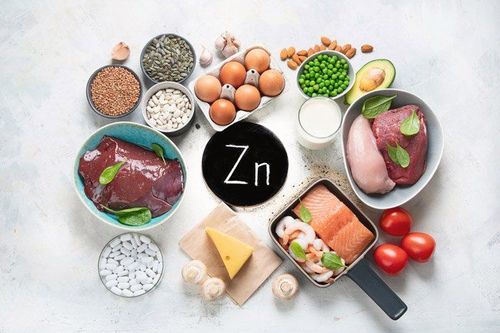This is an automatically translated article.
Zinc is an essential trace element that plays many roles in the body. Zinc deficiency is a contributing factor to nutrition-related morbidity worldwide. Preventing zinc deficiency in children through diet reduces the incidence and outcome of serious infectious diseases.
1. Zinc is in which food?
Both foods of animal and plant origin can provide zinc for the body. However, animal products contain significantly more zinc, with oysters particularly rich in zinc. At the same time, the body also absorbs zinc from animal foods much better than from plant-based foods. Your small intestine cannot absorb 100% of zinc from food, but only about 40% from meat, milk and cheese, while the absorption rate of zinc for vegetables is 20%.
| Thực phẩm có kẽm | Lượng kẽm (mg) trên 100 g thực phẩm |
| Hàu, mầm lúa mì, cám lúa mì | 10 - 25 mg |
| Trứng, gan heo, thịt bò, hạt hướng dương, hạt lanh, bột đậu nành, bột cacao | 5 - 10 mg |
| Lúa mạch đen, lúa mì, lúa mạch, yến mạch, quinoa, đậu Hà Lan, đậu lăng, đậu phộng, quả óc chó, hạt chia, sô cô la đen | 2,5 - 5 mg |
Both sweet potatoes and regular potatoes contain about 1 milligram of zinc, and other vegetables like chickpeas and kale also contain zinc. Vegetarians can also choose fortified vegan foods (such as cereals) or zinc-rich foods such as chickpeas, legumes, nuts, and tofu for zinc.
As mentioned, animal protein aids in the absorption of zinc, forming a complex that can be well utilized by the body. In addition, there are other nutrients that promote zinc absorption, including:
Histidine in almonds, peanuts, beef and pork Methionine in almonds, cod, mackerel, tuna Cysteine in almonds, peanuts, beef and pork Citric acid in apples, pears, berries and citrus fruits Zinc increases biotin activity, so zinc preparations are often combined with this vitamin. Through your diet, you can get biotin in the form of whole grain products, mushrooms, and meat.
2. Dosage of zinc supplements for children
In general, children will change zinc needs at different stages of development and different ages. Recommended dietary zinc intake ranges from 2 mg/day in young children to 9 mg/day in adolescent girls and 11 mg/day in adolescent males. You can refer to the additional dosage prescribed by the World Health Organization (WHO) specifically as follows:
| Độ tuổi | Lượng kẽm |
| 0 - 6 tháng tuổi | 2mg/ngày |
| 7 - 11 tháng tuổi | 3mg/ngày |
| 1 - 3 tuổi | 3mg/ngày |
| 4 - 8 tuổi | 5mg/ngày |
| 9 - 13 tuổi | 8mg/ngày |
| 14 tuổi trở lên | Bé trai cần 11mg/ngày |
| Bé gái cần 9mg/ngày |
3. Advice for children to eat to supplement zinc?
3.1. Children under 6 months of age Breast milk is the fastest and best source of zinc for infants. Breast milk in the early stages is not only rich in zinc, but also contains many antibodies and other nutrients. Therefore, during this period, you need to take advantage of your breast milk for maximum development, and limit formula feeding. That's why it's very important to get enough zinc and nutrients for pregnant and lactating mothers. Mothers need to add to their daily diet the following items:Rich in zinc such as seafood, meat, eggs,... Rich in vitamin C such as citrus fruits Nuts, beans, especially especially soybeans.

Kẽm có trong thức ăn nào là thắc mắc của nhiều phụ huynh
3.3. Malnourished children Prioritize foods with diverse nutrients such as seafood (fish, shrimp, eel, crab, oysters), meat or legumes, seeds, green leafy vegetables (broccoli), ..
3.4. You can stimulate your child's appetite with some zinc-rich foods that most children love, such as dark chocolate, buttermilk, yogurt, seafood, whole grains,... Because forcing children to eat enough is very difficult, mothers can also supplement zinc for children through functional foods according to the doctor's advice. However, zinc supplementation for infants and young children through daily fresh foods is still recommended because the absorption of zinc will be faster and easier.
Supportive foods that have been prescribed by a doctor can help your baby eat better, and at the same time provide adequate zinc and nutrients for the body. As a result, children can increase their immunity, support their comprehensive development in both body weight and health.
In addition to nutrition, parents can supplement zinc to help children eat well, reach the correct height and weight and exceed the standard. Zinc plays a role in affecting most biological processes taking place in the body, especially the breakdown and synthesis of nucleic acids, proteins... Organs in the body when zinc deficiency will develop symptoms. abnormal symptoms or specific diseases due to zinc deficiency such as neurological disorders, irritability,... Therefore, parents need to learn about the role of zinc and guide them to appropriate zinc supplements for their children.
In addition to zinc, parents can supplement their children with other important vitamins and minerals such as lysine, chromium, B vitamins,... for their children to eat well, have a good immune system, and strengthen their resistance to reduce illness. errands.
Reference source: pubmed.ncbi.nlm.nih.gov













